EBENEZER
 The first time I heard the name Ebenezer, I pictured a grouchy old man with a long beard living alone in a mountain shack. I might have an old black-and-white movie to thank for that. Or not. That’s not what Ebenezer is. Not even close.
The first time I heard the name Ebenezer, I pictured a grouchy old man with a long beard living alone in a mountain shack. I might have an old black-and-white movie to thank for that. Or not. That’s not what Ebenezer is. Not even close.
Initially, Ebenezer isn’t the name of a person. It’s a location, Eben-Ezer; more accurately, is a campsite. It’s also a large rock. Comes from the story of Israel’s number one king, David, in the book of First Samuel in the Bible.
Israel prepares to fight the Philistines, make their camp at Eben-Ezer. The Philistines set up at Aphek. The battle unfolds. The Philistines eat Israel’s lunch and hand their soldiers their hats. Well, helmets. The Philistines’ victory is a bloody one; Worse, the Philistines capture the Ark of the Covenant.
The Israelites return to Eben-Ezer to lick their wounds and wonder why the Lord their God allowed such a defeat. “Ah,” says one, “we need to have the Ark of the Covenant here with us. Let’s us go to Shiloh and bring it here. It will save us when we resume our battle.”
Battle resumes. Israel loses a lot more soldiers and the Philistines carry the Ark to their Ashdod where they set it in their temple to Dagon next to the stone image of their god. Next morning, Dagon’s flat on his face. Worse, everyone in Ashdod is afflicted with boils. The Philistines panic, want to get rid of the Ark. “Hey, Israel, come get your Ark. We don’t want it!”
Israel retrieves the Ark. The priest Samuel says to Israel, “Get rid of all your Baal and Ashtoreth images. They’re gumming up the works, keeping Israel from victory.” Israel complies.
Battle resumes. God joins the ranks of Israel with thunder and lightning. The Philistines run away in fear.
Between the tooth-shaped peak called Shen and the watchtower called Mizpah where the battle was won, Samuel commemorates Israel’s victory. He sets up a large stone. “This!” he announces, “is our Eben-Ezer, our Stone of Help. Thus far, the Lord our God has helped us.”
Thus Ebenezer became a remembrance of what God has done for those who put their faith in him.
This Ebenezer is my story. My remembrance of what God has done for me … how Jesus not only changed my life, but saved it.
BEFORE CHRIST
For the word of the cross is folly
to those who are perishing.
1 Corinthians 1:18a.
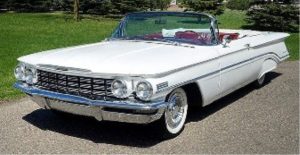 The summer of 1962, I was driving south on Highway 99, feeling cool and smug in my top-down 1960 white Oldsmobile convertible with the red leather seats. My two-week leave was over, time to report back to the Naval Amphibious Base in Coronado, California. I liked the Navy, looked forward to getting back in the groove of going to work every morning, but mostly going out drinking with the guys every evening.
The summer of 1962, I was driving south on Highway 99, feeling cool and smug in my top-down 1960 white Oldsmobile convertible with the red leather seats. My two-week leave was over, time to report back to the Naval Amphibious Base in Coronado, California. I liked the Navy, looked forward to getting back in the groove of going to work every morning, but mostly going out drinking with the guys every evening.
By the time I hit Turlock, the selection of radio stations changed. As I scanned the dial, all I could get was Mexican or religious broadcast. The salsa music didn’t appeal and as soon as I heard some guy with a Southern accent droning on about Jay-zus, I couldn’t turn the dial fast enough. Not for me, nossir. I’ll wait until I get closer to LA where I can find some music I like. I turned the radio off.
While I thought there probably was a God out there somewhere, my experience with Christ and Christians to date had been so marginal as to be nonexistent. My god of choice was having a good time punctuated by plenty of beer. As far as I was concerned, the Creator of the Universe could do his thing, I would do mine.
My investment in alcohol began when I was 15, sampling tastes from Dad’s liquor selection when nobody was home. I liked it. I liked the taste, I liked the way it made me feel. It was enticing. It was promising, made me feel a lot more in control. How’s that for irony.
In college, alcohol was easier to get; that we were not yet 21 was a surmountable problem. With an abundance of likeminded friends, we contrived creative ways to buy sixpacks of Green Death (Rainier Ale, our drink of choice) for the weekends. Then, of course, came fraternity keg parties where beer and misbehavior flowed. After my 21st birthday, it was a done deal: I could drink as much as I could afford.
By the time I left the Navy in December of 1963, I knew, deep in my soul, that I was an alcoholic; in all other ways, I refused to admit it. Making such an admission would mean there was something wrong. And that would mean I had to do something about it.
Sorry, making changes was not an option. Alcohol was my friend. I liked drinking too much to change. But I also knew there was a problem, a simple one: whenever it came time to drink, my goal was to achieve the buzz where everything felt wonderful, where talking to people (particularly girls) was fluid and fun and all was right with the world. But no matter how much I tried, the buzz-goal remained elusive and unachievable; I could never quite get to that place and stay there because once I started to drink, I couldn’t quit. With each drink, I felt compelled to have just one more. I stopped only when I became so unpleasantly saturated I simply couldn’t drink any more.
Morning hangovers were routine but never a deterrent. Whenever I had a particularly bad one, I would vow never to drink again…until Norm or Dan or Dale or Ed said, “Hey, let’s go have a drink.”
After my tour with the Navy ended, I went to work for our family business, Schipper-Dillon, a men’s and women’s clothing store downtown Santa Cruz. My tour with alcohol continued for another sixteen years.
August of 1964, Jeri Beth Jones and I were married. A year later, our son, Mark was born, followed by our daughter, Kelly’s birth eighteen months later. I had a lovely, caring wife and two adorable, delightful children. Everything was good. Except it wasn’t.
Alcohol continued to be an important, regular part of my life. After work, I had to have at least two beers. Weekends, I had no limit and if there was a party somewhere, we would go. Jeri Beth would have a couple of drinks and I would have more. Admitting I was an alcoholic continued to burrow deep; I locked the admission down, kept it from emerging into the light. Alcohol was my pal, my buddy, my friend. My god.
September 10, 1979. First day of school. Mark was a freshman in high school, Kelly was in the 7th grade. As we sat down for dinner, Mark opened the conversation with, “Dad, someone offered me drugs at school today.”
I blew it off, assuming it was lightweight stuff. “Marijuana?” I asked.
“No, it was heroin.”
I was stunned. Chilled. Mark and Kelly proceeded to unfold eye-witness accounts of kids in junior high and high school bringing liquor to school, smoking dope, snorting coke and finding some bit of privacy in the bushes or around corners where they could experiment with sex. Some of these children were thirteen.
Did the teachers know?
Yes, they did.
Did they do anything about it? No. Not even for the 13-year-old boy who
brought vodka to his 8th grade homeroom in a thermos and was drunk every day before noon. The teachers ignored him.
That night, I thought about what our children had said and I came to a cold, hard realization: I didn’t have the moral and ethical foundation to deal with this. I needed help.
It was then I thought about three exemplary people in my life: Larry Blake, Barbara Booth and Dan Baker. Their lives were different. They consistently held honor and integrity to a high standard. They had a sense of peace, of confidence that seemed to prevail in their lives, particularly in the face of temptation and trial. They had something I didn’t. It was attractive. It was compelling. All three were Christians.
After I graduated from Officer Training School, I was assigned to the USS Los Angeles, a cruiser based in Long Beach. Larry Blake had been a fellow officer. He wasn’t at all reticent about his faith, didn’t go carousing and drinking and skirt-chasing like most of the other junior officers. Well-respected, Larry held himself to a different and higher standard yet remained ‘one of the guys.’
Barbara was the bookkeeper at our store; Dan was part-time sales help during the holidays. I lost track of Larry after I left the Los Angeles, but hoped that one day, we could meet and I could thank him. Nevertheless, I liked what all three of them had. Whatever it was, I wanted it.
When I got home from work Monday evening, I told Jeri, “This Sunday, we’re going to church.”
A couple of years earlier, two Jehovah’s Witness ladies had come to the door, asked if they could talk to Jeri about God and Jesus and the Bible. Jeri was intrigued, wanted to know more. For a year, they met once a week. Then came the invitation: “Won’t you join our church?”
When Jeri said no, the ladies were puzzled. “Why not?”
“Because God hasn’t spoken to me.”
Awestruck, one said, “What? What do you mean?”
“In our study together, we’ve read about how God speaks to people, lets them know what he wants them to do. He hasn’t done that with me. So no, I’m sorry, but I’m not ready to join your church.”
What Jeri didn’t say was that she was crushed. Because she’d received no confirmation from God, she thought God didn’t want her.
Although her study with the JWs ended there, Jeri’s hunger to know if God was real and it persisted. Jeri remembers praying not long after, “God, if you’re there, if the Bible is really your word, I want to know. Please.”
He did. Jeri began to read the Bible independently. She began to understand what she was reading. She was thrilled with what she was learning about God and about Jesus.
Me, I thought this was a good thing, something like chicken soup for treating a cold, you know: it couldn’t hurt. But I understood none of it. Jesus and the Bible were fine for her, I said. Not for me.
So you can imagine her surprise when I said, “We’re going to church on Sunday.”
“Oh! Where?”
“Twin Lakes.” That was the church Dan and Barbara attended.
“Twin Lakes? Isn’t that a Baptist church?”
“Yep.”
“Don’t Baptists do weird stuff, like roll around in the aisles?”
“Dunno. We’ll find out.” (They don’t).
“So, we’ll go there, then visit other churches, see which one we like the best. Okay?”
Sounded good to me.
Although we went to Twin Lakes Church with the intent to visit other churches, that never happened. Twin Lakes Church became our church home.
That first Sunday morning, ten o’clock, there were the four of us, third row center. Pastor Roy Kraft stepped up to the podium and began his sermon. He wasn’t ten minutes into his text when he saw me, blinked twice, gave a half-smile and continued.
I’d known Roy and his wife, Jeanette, as customers at our store; Roy usually bought a new suit, sometimes two, every year.
That day, as Pastor Roy brought an end to his sermon, he spoke the words from John 3:16, “For God so loved the world, that he gave his only Son, that whoever believes in him should not perish but have eternal life.”
I’d heard John 3:16 before. It was ubiquitous. Christians batted the verse around like a badminton shuttlecock. I even remembered seeing it in the ‘50s and ‘60s as the tag line at the end of the Lutheran Church’s TV program, “This is the Life” that followed the Ed Sullivan Show on Sunday evenings. No matter that I’d heard it dozens of times, I never understood what it meant.
That morning, third row center at Twin Lakes Church, I got it.
AFTER CHRIST
I tell you the truth,
whoever hears my word and believes him who sent me
has eternal life and will not be condemned.
He has crossed over from death to life.
John 5:24
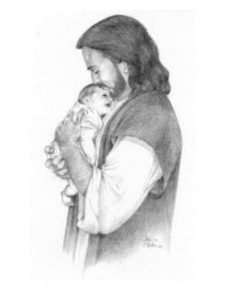 I understood what Jesus meant. I realized it’s incredible significance. I remember saying to myself, “This is what I’ve been looking for all my life.”
I understood what Jesus meant. I realized it’s incredible significance. I remember saying to myself, “This is what I’ve been looking for all my life.”
By Easter of 1980, I came to a crossroads of faith: decision time. Either Jesus was who he said he was – the Messiah, the savior of the world – or he was a flaming nut case. I decided for the Messiah option. It made far more sense.
Along with that decision, I knew I had to make some changes in the way I conducted my life, especially how I treated my family. But how?
More decisions were required. I needed to think. I needed to pray.
After church on the following Sunday, we came home and I went directly to the cabinet where I kept all my liquor and wine. What was left of a six-pack of beer came out of the refrigerator. I put it all on the counter next to the sink, removed the tops, popped the tabs on the cans.
I called to my family, “Jeri, Mark, Kelly, come to the kitchen, please. I need you to help me with something.”
They came into the kitchen, looked at the bottles and cans on the counter. With eyes filled with questions, they looked at me. What’s going on?
“I want you to help me pour all this down the drain. And I will make this promise, this commitment to you: I will never drink again.”
Eagerly, they grabbed bottles and cans and the four of us poured bourbon and gin and scotch, burgundy and Chablis, and beer down the drain.
Something astonishing happened as those last drops of alcohol flowed down the drain: my desire for alcohol went with it. I no longer wanted to drink. In that moment, my twenty-five-year devotion to alcohol lost its appeal.
The doors on my self-made prison burst open. I was set free.
But it wasn’t just my drinking that was the problem. When I drank, I was unpredictably angry, ready to explode and turn our family into an arena of upset and fear. Often, Jeri and the kids tiptoed around me, never knowing what might trigger another eruption of anger. Watch out! Dad’s got a short fuse and he’s explosive!
But that was just the beginning. Although I’d quit drinking, I still felt like an uncontrollable monster was living in my soul, ready to attack at the slightest provocation. My threshold of frustration was paper-thin; my hair-trigger anger was barely manageable. Yes, I was no longer under alcohol’s thrall but that didn’t stop me from giving the three people I loved more than all others reason to fear my wrath. My alcoholic behavior continued. Some might call me a ‘dry drunk.’
Hungry to learn more about Jesus, about the Christian faith, we went to church Sunday mornings and Sunday evenings. Wednesday evening classes were helpful and joyful. A Thursday evening Bible study group became a regular part of our week. We gave thanks before our meals. We tithed to the church. We made an effort to model what we were learning with each other, and with others. Sometimes we failed; more often we succeeded. Peace began to show up in my behavior. The tension at home diminished, but only by a few increments.
My impatience and critical attitude remained in force; anger was never far away. Triggers of frustration, blame, foolish assumptions, rush to judgment, disdain for contrary opinions hovered near the surface, ready weapons in my arsenal. In simple terms, I would tantrum because I couldn’t have my way. To this day, there are times ‘old news’ surfaces and I struggle against these things once again.
Faced with my dilemma, the words of the song, ‘Change My Heart, O Lord,’ took on a special meaning. Yes. I needed that. Back to prayer, serious prayer: “Help me, Lord … I can’t continue to treat my family and friends and employees this badly. You have said my greatest priority is to love God with all of my being, and to love others as I love myself; help me, Lord, to love you more, to accept myself as the man you have created, tarnished by unrighteousness yet seeking your heart. As I come to accept myself as your own creation, beloved and precious, may I love all others – especially my wife and children – as you love them.”
Gradually, I began to experience a greater peace of mind. I became less judgmental, slower to react without thinking, more able to act rationally. Having gasped for spiritual breath all of my life, finally, I was able to breathe. Then something astonishing happened.
AT THE FOOT OF THE TREE
It is the Spirit who gives life; the flesh counts for nothing.
The words I have spoken to you are full of the Spirit and life.
John 6:63
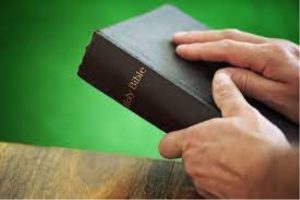 As Jeri and I continued to learn about Jesus, about God, and about the majesty and undying truth of the Bible, so did our children. By April of 1980, each of us had each professed faith in Jesus as our Lord and Savior, believing in him to be the Son of God, the Messiah, the Savior of the world who gave his life that we might live in eternity with him. April 20th, two days before my 42nd birthday, Pastor Roy Kraft baptized us as a family at the evening service.
As Jeri and I continued to learn about Jesus, about God, and about the majesty and undying truth of the Bible, so did our children. By April of 1980, each of us had each professed faith in Jesus as our Lord and Savior, believing in him to be the Son of God, the Messiah, the Savior of the world who gave his life that we might live in eternity with him. April 20th, two days before my 42nd birthday, Pastor Roy Kraft baptized us as a family at the evening service.
Refreshed, delighted with my new faith, full with hope and promise, I thought going to a conference at Mount Hermon would make a great summer vacation – and it was only seven miles away. Jeri and the kids agreed, so on Sunday, June 15, we made the drive to Mount Hermon and checked into our rooms.
Biblical scholar, Dr. Ralph Kiper, was the keynote speaker that week. The mission agency, People International, was also there with a group of indigenous pastors and evangelists from Mexico, China and Africa. The pastor from Nigeria, David Odofin, stood about 5 foot 2, weighed less than 100 pounds and had a spirit of joy that beamed from him like a searchlight. His smile alone could light up a room.
We had a wonderful week, meeting other Christians, hearing what God was doing throughout the world, and learning more about the Bible. On the last day of the conference, two things happened: first, we heard the announcement that David Odofin’s retinas had separated and he’d been rushed to Stanford Hospital for emergency surgery. Second, I had the most amazing experience of my life: I met Jesus, face to face.
Friday afternoon. The conference was winding down. I wanted to have a little time to myself to reflect on my journey with Christ so far. The courtyard area near the auditorium was quiet and empty. It seemed like a good place. With a notepad and pen, I sat on the edge of a planter box. Grateful to be alone, I began to write.
In minutes, I laid down the basis for a poetic allegory of my coming to know Jesus.[1] For another twenty minutes or so, I wrote, pouring out my heart of faith. I stopped and read what I had written. I read the final paragraphs aloud then raised my hand and hollered, “Yes! This is what I believe!”
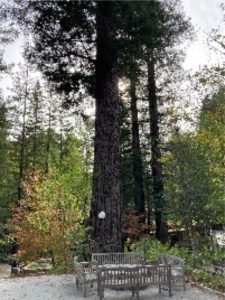 To fully describe what happened then, I cannot do justice. It was as if a cloud of light emerged from somewhere near a huge redwood tree across the courtyard and moved toward me. As it enveloped me, I began to feel a deep, profound sense of joy. I experienced an acceptance I had never felt before and I knew I was in the presence of Jesus himself.
To fully describe what happened then, I cannot do justice. It was as if a cloud of light emerged from somewhere near a huge redwood tree across the courtyard and moved toward me. As it enveloped me, I began to feel a deep, profound sense of joy. I experienced an acceptance I had never felt before and I knew I was in the presence of Jesus himself.
This was too good to keep to myself! I ran back to our room. The kids had already gone out to meet with their new friends; Jeri was just getting ready to meet a friend for coffee.
“Jeri! You won’t believe what is happening to me!” And then words failed me. I had no way to convey the depth and breadth of what was happening to my soul. I tried, babbled, failed. She knew this was just for me, gave me a hug and left.
Standing alone in our room, the presence of God intensified, filling and filling and filling with such overwhelming joy I could no longer stand. My knees buckled and I knelt on the floor, weeping wept tears of joy and gladness I thought would never end. In the depth of my soul, I knew I was loved. I knew I was saved. I knew I was His.
Gradually, the joy subsided, yet remained. For weeks after, I felt like I was walking a foot off the ground.
Later that day, I ran into the man who headed up People, International and asked about David Odofin. He said David was recovering but that they were looking for a family to host him for two weeks while he recovered. I volunteered.
David became our house guest and ‘in-house pastor’ for the next two weeks. He and blessed us with Bible studies, the first of which was John 15; “I am the vine and you are the branches.” During his stay, we learned that as David was being taken to the hospital, he resigned himself to never seeing his wife or two children again; in Nigeria, the hospital is the last resort, where there was only a 50-50 chance of living.
We took David on tours of Santa Cruz and he was delighted to see Monterey Bay (What river is that?) and the Henry Cowell Redwoods (They are so big!). His greatest thrill, perhaps, was his visit to McDonald’s where he watched them make hamburgers.
Because we owned a clothing store, we were able to give David a new suit, shirts, ties, underwear, socks and a suitcase to carry them in. Remarkably, because of David’s small size, we had only one suit in 37 Short. It fit him perfectly.
This diminutive man with a giant heart was a blessing to us, and a joy to know. Tragically, I learned three years later that David, while studying at Dallas Seminary, died of a heart attack.
A TIME TO LEARN
…the Holy Spirit, who the Father will send in my name,
he will teach you all things
and bring to your remembrance all that I have said to you.
John 14:26
 Roger Moore, one of the pastors at Twin Lakes Church, led a Sunday school that met the hour before regular church service. Meeting in an adjacent building with a large auditorium space, on any given Sunday as many as 300 to 350 people would attend.
Roger Moore, one of the pastors at Twin Lakes Church, led a Sunday school that met the hour before regular church service. Meeting in an adjacent building with a large auditorium space, on any given Sunday as many as 300 to 350 people would attend.
Friendly, engaging, laid-back, and solid in his understanding of the Bible, Roger shared lessons that were filled with wisdom and with humor and grace. His teaching made the Bible comprehensible and fun. Week after week, Roger helped us understand how Jesus’ words and work applied to living today, here and now.
As part of his teaching, Roger introduced us to the Timothy program, a 5-week study that called for a mature Christian to meet with someone new to the faith, modeled after the Paul and Timothy relationship from Acts 16. Jack Atnip offered to be my Paul. We met at our house before work on Thursday mornings, open our booklets and Bibles and dive in the topics, asking questions and seeking answers. After I’d done my ‘Timothy’ part, I went on to serve as a ‘Paul’ to Paul Spurlock (who is now the Missions Pastor at Twin Lakes Church) and Steve Irving.
As Steve and I met, we prayed for one another. Steve had asked me how I become a Christian; I told him the story, included the influence of Larry Blake, Dan Baker and Barbara Booth. That morning, as we closed, Steve specifically prayed that someday, I would have the opportunity to thank Larry Blake.
For me, learning about Jesus and God and the Holy Spirit, about the Bible, was like enjoying a diet of exceptionally good meals. I was hungry for more. I guess my enthusiasm showed, because in 1984, Roger asked me to become the president of the Sunday school class. I was honored and enjoyed welcoming new folks to the class, making announcements and introducing Roger.
A year later, Roger, a graduate of Denver Seminary and a member of the seminary’s governing board, announced that he’d arranged for any men or women who were interested to join him on a trip to Denver Seminary where we could sit in on classes for one week. It sounded wonderful and I jumped at the chance. I sat in on classes on theology, church history, and apologetics. I learned a new word that literally lit a fire in me: exegesis–the critical interpretation of the biblical text.
Seminary was great and I wanted more. But how?
Not long after our return to Santa Cruz, I called and made an appointment to meet with Roy Kraft. On the day of our meeting, ever gracious and consummately patient, Roy asked, “What can I do for you?”
“Roy, I feel like a wishbone.”
Eyebrows raised, he smiled. “Care to explain that?”
“Yes. My head is in my business but my heart is in the ministry. I’ve got the business to run, two children in high school, college on the horizon but I have this pull to be in the ministry. I don’t know what to do.”
He asked a simple, elemental question: “Have you prayed about it?”
Embarrassed, I said, “No.”
“Let’s take care of that right now.”
1985 was a banner year for our family business; sales and profits were up, expenses were manageable. In January of 1986, the business looked equally promising. It wasn’t. By year’s end, for the first time in the store’s history, the cost of doing business exceeded the sales revenue. That year, we operated at a loss–a significant one. At our year-end director’s meeting, my uncle said, “We can’t have another year like this. We have to do something.”
We discussed our options: move to the Capitola Mall (quickly dismissed: twice the rent for half the square footage), drop the women’s department and go to a men’s-only operation, or liquidate our inventory and close the business.
We opted for the latter. Once we made that decision, it was up to me to get the job done; my father and my uncle, who had started the business and invested their lives in it for almost 40 years, were done. They never set foot in the store again.
We began the liquidation right after Thanksgiving. It was a grind, physically and emotionally. Bringing what had been a prosperous business to an end was very much like attending to a death, and it influenced how we felt. Some of our regular employees stayed on to see us through to the end; others chose not to. We hired a couple part-timers to fill the gap. By the time Christmas came and went, there was so little inventory left that only Jeri, Mark, Kelly and I were needed to see to our last business days. On December 31, our very last day, we had sold off our entire inventory except for a sport coat. A man stopped by, saw it, purchased for $25. In that process, we sold most of our fixtures, mannikins and even managed to find a buyer for the steam press and boiler from our tailor shop. After 39 years in business, at 5:00 on December 31, 1986, we locked the doors for the last time.
After the hectic pressure of the liquidation sale, Jeri Beth and Mark and Kelly and I enjoyed two weeks in Maui.
Six months later at the age of 50, I enrolled as a student at Denver Seminary. Before I left for seminary, though, I had one more thing to do: I told Dan Baker and Barbara Booth how they had influenced me to become a follower of Christ and thanked them.
BACK TO SCHOOL
For we are his workmanship,
created in Christ Jesus for good works,
which God prepared beforehand,
that we should walk in them.
Ephesians 2:10.
 Initially, I assumed that I would study to become a pastor and take a position with a church after I graduated. God had other plans. As soon as I began the pastoral curriculum, I felt something was wrong. Some interior resistance, some urging caused me to step back and re-evaluate.
Initially, I assumed that I would study to become a pastor and take a position with a church after I graduated. God had other plans. As soon as I began the pastoral curriculum, I felt something was wrong. Some interior resistance, some urging caused me to step back and re-evaluate.
In prayer, it seemed as if God spoke to me: “I have prepared you all your life to become a counselor in my Kingdom.” I knew I had to change my major. Two years later, I graduated with a master’s degree in Christian counseling.
Sadly, that December, I received a phone call from Bob Hughes, a friend from church, with the news that Roger Moore had died. The news hit me hard, for Roger had been such an important part of my learning and becoming a student at Denver Seminary. While I wasn’t able to attend the memorial service, Dr. Haddon Robinson, president of Denver Seminary was. When he returned to Denver, he told me that the sanctuary was packed; people were standing in the aisles. At one point, Pastor Roy asked everyone whose life had been touched by Roger to stand: Haddon said nearly everyone there stood.
The course work, a combination of theology, Old and New Testament and dozens of classes in psychology, challenged, refreshed and fulfilled me. For the first time in my life, I got straight As. I met many wonderful people and made some lifetime friends, several of whom I continue to keep in touch with.
And I got an extra, unanticipated blessing, one of the most significant I have ever enjoyed. Dr. Vernon Grounds, chancellor emeritus of the seminary, took me under his wing. “I want you to meet with me in my office for lunch every Thursday at 12:30. We’ll talk.”
As it turned out, our ‘talks’ constituted much of my education for Dr. Grounds–a remarkably kind man whose wisdom and grace flowed from him as naturally as an artesian spring–tutored me not in the way of theory but in practice, of being follower of Christ and a man of God. His teaching was never pedantic; rather, it was by example. Vernon–he asked me to call him that–simply lived the gospel of Christ, expressing love and truth and grace in word and deed. Impossible to express scope of his influence on me, I am grateful beyond words.
On September 12, 2010, at age 96, Dr. Vernon Grounds, mentor, friend, theologian, counselor to counselors, and man of God, left us to enjoy the presence of Jesus. I miss him.
On the last day of classes before graduation, I was standing in the student lounge, talking with Tom Dyer when Tom suddenly hollered, “Larry! Larry Blake!”
I couldn’t believe what I was hearing. I turned around and saw the man who thirty years earlier had influenced me, without knowing, to become a Christian. Tom and Larry had known each other for years and were close friends; Larry had performed Tom’s wedding ceremony. Today, Larry, who worked for the Navigators in Colorado Springs, had come up to congratulate Tom on his graduation from Denver Seminary. I nearly knocked Tom over, running to meet Larry.
“Larry, you and I were on the USS Los Angeles together. Remember me?”
“Uh, no.”
“Anyway, I need to thank you. You were instrumental in my becoming a Christian.” I unfolded the story. Larry grinned. I asked him if I could give him a hug.
Steve Irving’s prayer had been answered. Larry and I still exchange Christmas letters.
After graduation, Jeri and I flew to Santa Cruz where I was ordained at Twin Lakes Church. Standing before the ordination board was a daunting and welcome challenge. The ordination service that followed the next evening was a joyful celebration, doubly so in that our son and daughter were there.
But now what? I had no idea. Back in Denver, I had no job offers and little direction, despite spending hours contacting the many opportunities listed on the seminary’s job file plus a couple of pastoral job location services.
God, as they say, provides.
Dr. Gordon Lewis, one of my theology professors, arranged for me to meet Bruce Montgomery, a pastor and doctoral student from Pueblo, Colorado. Bruce explained, “We need a Christian counselor in Pueblo. We’d like you to consider coming to Pueblo, set up a practice there.”
Bruce explained that in a city with a population of nearly 100,000, there was only one Christian counselor, whose availability was limited: she worked for a church and her clientele was limited to church members.
Jeri and I prayed about it, discussed it and decided to take a look. We drove to Pueblo, met with Bruce and his wife, Connie, and visited his church, Broadway Christian. The opportunity was promising, and we felt the Lord’s confirmation. Hopeful and encouraged, we found an apartment and office space, packed up our belongings and moved. Things were coming together.
ANSWERING THE CALL
And I heard the voice of the Lord saying,
“Whom shall I send, and who will go for us?”
Then I said, “Here I am! Send me.”
Isaiah 6:8.
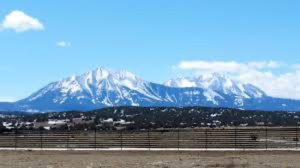 That first year in Pueblo was difficult. During those early months, I feared we had made a mistake and I often thought about returning to the job search. Being new in town, I was an unknown; clients and revenue were slow to come. Although Jeri had found a job with a Christian adoption agency which helped to see us through, I was discouraged. Very discouraged.
That first year in Pueblo was difficult. During those early months, I feared we had made a mistake and I often thought about returning to the job search. Being new in town, I was an unknown; clients and revenue were slow to come. Although Jeri had found a job with a Christian adoption agency which helped to see us through, I was discouraged. Very discouraged.
That was when Tom Beaman, a classmate from seminary, called. “Five of us are getting together for a week-long in-depth Bible study and retreat next month. We’ve got a place in Estes Park. How would you like to join us?”
Fellowship and study with five guys I knew and liked sounded incredibly good. It was a Monday morning when I drove to Estes Park and met with Tom, Mike Blevins, Chaim Urbach, Tom Dyer and Bob Blahnik. Tom Beaman pastored a church in Longmont, Colorado; Tom Dyer had a church in Lyons, a nearby community. Mike was an assistant pastor in a Denver suburb church. Bob had a church in Illinois. Chaim led a Messianic Jewish congregation in Denver.
We shopped for groceries, unloaded two cartons of reference books we’d brought along and started in on the book of Malachi. We’d decided to study a relatively short book, one we could exhaust in a week’s time, and for five days, we delved into the text, mining it for nuggets. Chaim’s knowledge and understanding of Judaism’s perspective and influence on Scripture was encyclopedic. We ate well, slept well, took recreational breaks, laughed until our sides ached and prayed seriously. By Friday, we and Malachi were exhausted. It was a wonderfully refreshing week, just what I needed.
My drive home was blessed by the afterglow of our time together, but the closer I got to Pueblo, the more my uncertainty and discouragement rose up again. My five friends all had pastorates, paid positions and benefits. Me? I had none of that. Although blessed to have Jeri’s income and my iffy one, I wondered, had we made a mistake? Was this truly something the Lord wanted me to do? Or was it just an opportunity that looked good based on someone else’s ideas.
Several miles past Colorado Springs, Highway 25 takes a broad sweep to the right. A clear view of the south end of the valley past comes into view, anchored by the majestic Twin Peaks at the far end. Walsenburg and Trinidad nestled at Twin Peaks’ base.
As I made the turn, I saw a sight that amazed me: a perfect cross was emblazoned on the eastern peak, reaching all the way from top to bottom and side to side. The edges were perfectly straight. The cross was completely filled with snow, stark white against the dark background of the mountain. It was impossible to miss. “My gosh, someone has taken a bulldozer and carved that out. That is amazing!”
Then I realized the two twin mountains were right where they were supposed to be. The ‘mountain’ I was seeing, the one with the cross on it, was a third peak!
I got so excited, I wanted to stop my car, get out, and make everyone else stop. “Look at this! This is an amazing sight! Do you see it? Jesus is HERE!”
Then I realized I was the only one who could see it.
God had given me a vision. Along with it came the understanding, the unspoken assurance, ‘Yes, I am here, Peter. Rejoice and be glad. My peace I give to you.”
For the next five years, my counseling practice prospered. In addition to founding the Christian Counseling Center, I served as an associate pastor at Broadway, and as a clinical therapist at Parkview Hospital’s Christian wing of their Anxiety and Depression Unit. In 1994, I served as pastor to a small mountain community church outside Canon City that met in a barn on Sunday evenings. I had a steady stream of speaking and teaching engagements at Pueblo Community College, Parkview Hospital and St. Mary-Corwin Hospital.
For five years, we had many challenges and blessings, trials and rewards. Together, we made some delightful friends, served where we could and learned any good lessons, a few great ones … and some very hard ones.
As my counseling practice built up, we were able to fly back to Santa Cruz every summer to visit our family and friends. Jeri’s parents still lived in Santa Cruz, mine had a place in Placerville. Our daughter, Kelly, was enrolled in San Jose State, lived with Jeri’s mom and dad and commuted; our son, Mark, worked for a few years installing sheet rock, then found a position in the computer industry. At Christmas time, we flew Mark and Kelly out to Pueblo.
Throughout those years, however, we continued to miss our family and friends. Pueblo, although our place of livelihood, never felt like home. Santa Cruz was our home, that was where our hearts were. And our hearts ached. We prayed.
1994 was a particularly good year. I was seeing 5 and 6 clients each day, counseling at Parkview Tuesday and Wednesday mornings was productive and encouraging. Our income was good.
1995 was a different story. In January, I lost my voice. At first, I thought it was laryngitis, but after a second week with no signs of getting better, I saw an EENT specialist. “You have a virus. It has paralyzed one of your vocal cords.”
I whispered a croaky, “Will it get better, or will my voice be this way from now on?”
“It will get better, but it will take time. By the way, there is no treatment for this.”
As a counselor, preacher and teacher, speaking was my livelihood. Having a barely functional voice, my first casualty was preaching at the mountain church; with regret, I resigned that position. Hosting seminars, guest teaching? No longer an option.
Trying to talk with clients in the office was near-to-impossible.
After three months, my voice gradually returned. Then Parkview closed their Christian section of the Depression unit–sorry, everyone, insufficient revenue. Two months later, a medical insurance gatekeeper came to Pueblo and designated which mental health clinics and practitioners would receive insurance reimbursements. The approved list was short; I was not on it. To compound the problem, my counseling practice began to dwindle.
What followed was inevitable: my revenue stream ebbed, dwindled and approached life-support. Without enough money to make the rent, I closed my office. The board of directors at Broadway graciously gave me permission to set up an office at the church, rent-free. I was able to continue to see a few clients.
Over the course of that year, each of my revenue sources steadily diminished, then closed one by one. Then Jeri lost her job.
Desperate, I scrambled to find options; update the resume, get back with the pastoral job search agencies, send out letters, make phone calls, contact friends, anything that might produce results. Somewhere in that mix, I filed an application with Holiday Senior Retirement Corporation; Jeri and I had visited the Holiday facility in Pueblo. It was nice, I thought; I could work in a place like this.
Weeks passed. Nothing happened. Our savings waned, then zeroed out. When our health insurance went away with Jeri’s job. We prayed that neither of us would get sick. We ate frugally, walked instead of drove, cut expenses wherever we could. Bankruptcy loomed on the horizon. We prayed. We hoped. We trusted God.
Nothing changed.
One day, a woman I hardly knew, approached me and handed me an envelope. She said, “I think the Lord wants me to give this to you.”
I thanked her. There was $50 in the envelope.
Parkview Hospital called: “We need a clinical therapist for the graveyard shift tomorrow night. Can you take it?”
Yes, of course, and thank you. The shift paid $64. After that, Parkview called at least once a week: Yes!
A few payments of my outstanding accounts receivable came in the mail. I continued to see two clients. We were able to cover our expenses, barely.
Amazingly, throughout this entire time, the Lord continued to provide for us. We never missed paying any bills. We never missed a meal. We were healthy. Yet all I could see were the pieces of our life, crumbling, collapsing, one by one. Helpless, Jeri and I stood by and watched it happen. Where my hope had once been a shining light, it was now a dim and dimming spark.
Then, when I thought nothing could get worse, a compassionate friend took me aside and said, “Pete, I think you’re depressed.”
As soon as she said those words, I knew she was right. After all, I was a therapist, I knew the symptoms, was trained to see them in everyone but myself. I made an appointment with our GP that afternoon; he prescribed an antidepressant.
That night, unable to sleep and consumed with worry, I got up at 2:00 a.m. and went downstairs to sit on the couch and stare into the darkness. Filled with sorrow and regret and self-pity, I wept and cried out to God. “I’ve tried everything I can think of, Lord, and nothing works, nothing happens. I don’t know what to do. If anything is going to happen, Lord, you’ll have to do it. I’ve got nothing left.”
Three hours later, the phone rang. I looked at the clock. 5:00 a.m.
“Hello, I’m calling from the Holiday Retirement Corporation. I’ve got an application for you and your wife to be co-managers at one of our facilities. Are you still interested?”
“Yes! We are!”
“Well, we’ve got an opening at our facility in Santa Clara, California. Do you know where that is?”
I couldn’t believe what I was hearing. “Ah, yes, I’m from Santa Cruz, it’s only 30 miles from Santa Clara. Sure, I know where it is.”
Lord, is this you?
The caller told me about the job, what it entailed. “We’d like to fly you and your wife out to interview with the managers. Shall I go ahead and make the arrangements?”
“I need to confirm with my wife, first. Please, give me your number, I’ll call you back later today.”
Then, in a voice filled with surprise, he said: “Hey! Wait a minute! It’s five o’clock in the morning! Why am I calling you at five o’clock?”
I laughed. “I know why. You’re an answer to prayer.”
“Wow. Hey, I believe in prayer. I’m a Mormon!”
God, what an amazing sense of humor you have!
Jeri and I met with the managers of the Santa Clara facility later that week. Our interview was promising. Scott and Joan were friendly and encouraging. When we asked if they were Christians, the answer delighted us: “Yes, we are.”
One month later, I pulled our U-Haul van up to the curb of the Santa Clara retirement facility and we began the next step of our journey.
THE UNPROMISED LAND
Even though I walk through the
valley of the shadow of death,
I will fear no evil,
for you are with me.
Psalm 23:4
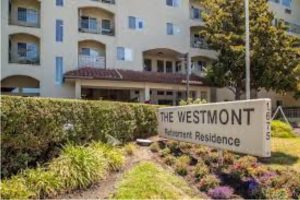 We started our new job as co-managers at the Westmont mid-May of 1996. The three-story facility housed a population of more than 100 seniors, most of whom were bright and endearing. Both the managers and co-managers ate, slept and worked at the facility. Our apartment was small, but comfortable enough and the meals were plentiful. The present looked promising. The future? As ever, not what we expected.
We started our new job as co-managers at the Westmont mid-May of 1996. The three-story facility housed a population of more than 100 seniors, most of whom were bright and endearing. Both the managers and co-managers ate, slept and worked at the facility. Our apartment was small, but comfortable enough and the meals were plentiful. The present looked promising. The future? As ever, not what we expected.
Shortly after we began our employment there, I began to teach a Bible study on Thursday afternoons. Starting with Genesis, I hoped it would appeal to many of our Jewish residents. It did, and soon 30 or 40 seniors attended our ‘church.’
About that time, two new retirees arrived, Lester and Pauline Meyers, who were especially enthusiastic about my teaching. We developed a nice friendship and one day after I finished a lesson on the Sermon on the Mount, Paul said, “I don’t know three other pastors who could exegete that passage with the same skill as you have.” I was honored.
Two months later, Scott and Joan were transferred to another facility. Where we had found a congenial relationship and pleasant work environment with them, it abruptly changed with the arrival of the new managers; they exhibited none of the patient and encouraging qualities we’d previously enjoyed with Scott and Joan. It quickly became apparent that we were a less than a compatible team. After six months, it was no surprise when they informed us: “We’re having you transferred to another Holiday property: Hilltop, in Redding, California.”
This meant another move, different procedures, and new faces. Discouragement would have led to another time of depression, I’m sure, save for the fact that our new managers in Redding were also a man and woman of faith. The facility was smaller, easier to manage, and once again our relationship with the people we worked with was congenial.
Although things were once again more pleasant, neither Jeri nor I were convinced that this was how we were to spend the remaining years of our working lives. At age 58, I wasn’t done working. Managing a retirement facility until it was time to retire didn’t seem to be the answer.
Back to the job search.
I had found two online agencies that specialized in placing pastors and Christian workers. I freshened my resume and embarked on the process once again. I was hopeful; Jeri, deeply discouraged, was not.
A week later, I had received three possible job opportunities. On my applications, I had stipulated that our geography was limited to California; we wanted to remain as close to our parents and our children as possible. One of the opportunities was in the Midwest, an automatic no; two were in California. I followed up but got no response from either one.
At the beginning of the second week, I received a memo from CityTeam Ministries: they were interviewing for a Director of Personnel. Sounded good. This was something I had some experience with, something could do. I called, got an appointment. On a Friday, Jeri and I drove to San Jose where I interviewed for the position with Denise Hadley, VP of Human Resources; later, I met with the rest of the HR staff.
The interview energized me like a shot of vitamin B times ten. CityTeam had residential drug and alcohol rehab ministries to men and women, a crisis pregnancy residence, a children’s program in disadvantaged neighborhoods, and a camp in the Santa Cruz mountains. They also had rehab programs in Oakland, San Francisco, Chester, Pennsylvania, Portland, Oregon and Seattle.
They were well funded. They had an excellent reputation. It was perfect. I wanted them. But did they want me?
Denise asked me to provide some references. Of course, I asked Pastor Roy Kraft if he would be so kind, and my friends from the Westmont, Lester and Pauline Myers. As I later discovered, Lester and Pauline had been the founders of CityTeam Ministries.
The next two weeks were full of anticipation. On a Friday afternoon, the phone rang. It was Denise Hadley: “We want you to come work for CityTeam Ministries, Pete.”
It was hard to take the next breath; I think I may have skipped a heartbeat or two. She told me what the salary would be. I was stunned; it was more than generous.
She told me wanted me to start in two weeks; time enough to give notice, pack up a U-Haul and move one more time.
Grateful, I had no doubt that the Myers’ recommendation had influenced the decision for my hire.
God was still working.
PROMISED LAND
For we are God’s workmanship,
created in Christ Jesus for good works,
which God prepared in advance for us to do.
Ephesians 2:10
 My initial learning curve was steep. Although I had addressed a number of HR functions as manager of the family business, I quickly found there was a great deal I didn’t know. HR law was a lot more complex than I realized.
My initial learning curve was steep. Although I had addressed a number of HR functions as manager of the family business, I quickly found there was a great deal I didn’t know. HR law was a lot more complex than I realized.
In addition to handling personnel issues, my collateral duties included managing the health insurance packages for our many employees and their dependents and attending to corporate safety and security. Denise was patient and took time to explain many of the nuances of human resource management. I was grateful.
Part of CityTeam’s requirement for their staff was to choose one of their ministries and spend at least two hours each week there, teaching or serving: there were plenty of opportunities to apply my counseling skills with the men and women in CityTeam’s rehab programs. It was a great job, full with opportunities for ministry.
When Hurricane Katrina struck the Gulf Coast on August 25, 2005, CityTeam quickly became involved. On August 27, CityTeam sent two exploratory teams to the area, one to New Orleans and the other to Bay St. Louis, Mississippi. While their findings were grim, they were also encouraging: from our experience in operating rescue missions and a camp, we had the expertise to provide meals to large numbers of people. We also had a ready-made cadre of volunteers–close to 100% of the men enrolled in the San Jose, Oakland and San Francisco rehab programs said, “Send us! We’re ready to go!”
In October, I volunteered to go to New Orleans for three weeks. My first assignment was with an 8-person team of volunteers engaged in stripping a hard-hit church in the Ninth Ward, the Firehouse of Faith. Everything on the first floor had been damaged by the floodwaters, but because the storm had ripped a hole in the roof, the entire second story was drowned in rainwater as well. We took furniture, appliances, carpeting, and curtains to the curb to be hauled away. Next came the sheet rock, now covered with colorful and toxic mosaics of mold. The need to wear gloves, goggles and face masks in addition to the oppressive humidity added to the difficulty of the work, but after three 9-hour days, we got everything stripped out, cleared and swept, ready for the next team to come in and begin re-building.
I was impressed: our team was comprised of four women and four men, the youngest of whom was 62.
The rest of my time in New Orleans was spent meeting with storm survivors and refugees for placement in other states. FEMA had quickly established a program wherein any Katrina refugee willing to relocate to select cities and states would be provided with shelter, food, transportation and a job.
In the aftermath of the storm, we heard a lot of criticism of FEMA and the Red Cross, much of it borne from the urgency of fear and pain and loss. In all, it was my experience that, while no system or agency, federal, state or municipal could possibly have been prepared to deal with the magnitude of Katrina’s wreckage, the FEMA workers I met and worked with were truly concerned and compassionate people, committed to do all they could for the aid and recovery process.
For the next five years, CityTeam continued to recruit, train, equip and send volunteers to the Gulf Coast. Because security was one of my responsibilities, I ran background investigations on each volunteer we sent to the relief effort. That first year, we were sending teams of 20 to 30 volunteers every two weeks; while felony convictions were immediate disqualifiers, we had surprisingly few.
Because Katrina’s wrath wasn’t limited to New Orleans, a year later our entire HR team of eight went to Bay St. Louis. We spent two days stripping one home down to the studs in preparation for the arrival of the next team who would put in flooring and walls; when that was done, we finished the week painting and doing a final clean-up at a second home.
The residents of Bay St. Louis were more than grateful. Identified by our blue tee shirts with the white CityTeam logo, it wasn’t unusual for folks in that hard-hit town to stop and give us a thank-you, even to buy us a meal.
By 2007, I’d been at CityTeam for ten years and decided to give it one more year. I planned for a last day of November 14 of 2008–exactly eleven years from my date of hire–and gave my notice. Finally, retirement was in sight, only a year away.
The Lord had different plan.
One evening, I went online to see what Mount Hermon’s summer concert series was. Over the years, Jeri and I had enjoyed several their concerts and programs. I had also attended four of Mount Hermon’s Christian Writer’s Conferences where I’d learned a lot about writing and the Christian writer’s marketplace.
While I was on the website, on a whim, I thought to check out Mount Hermon’s employment page. Although I had no intention other than to see what was offered, the listing at the top of the page made me laugh. Here was a hand-made direction from God himself: Mount Hermon needed a part-time HR manager.
I sent my resume. A few days later, I received a phone call from Alden Johanson, Mount Hermon’s Operations VP, asking me to come for an interview. My last day at CityTeam was a Friday. The following Monday morning, I reported to work at Mount Hermon.
FROM FULL-TIME TO PART-TIME
For you were called to be free…
to serve one another humbly in love.
Galatians 5:13
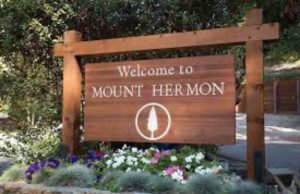 For an organization as complex as Mount Hermon–just over two square miles of residential community with rental properties, a conference center, camps for teens and pre-teens, a recreational field house and zipline in the redwoods, plus all the infrastructure sufficient for a small town–I was surprised to find that the HR department needed a lot of work to bring it to compliance. My task for the next three years was ready-made.
For an organization as complex as Mount Hermon–just over two square miles of residential community with rental properties, a conference center, camps for teens and pre-teens, a recreational field house and zipline in the redwoods, plus all the infrastructure sufficient for a small town–I was surprised to find that the HR department needed a lot of work to bring it to compliance. My task for the next three years was ready-made.
Jeri had encouraged me to retire when I left CityTeam, but after having worked for so many years, I knew I’d have difficulty bringing a lifetime of productive work to an abrupt end. A part-time position at Mount Hermon made a lot of sense. It turned out to be not only a good transition, but a delightful place to work.
January of 2010, Jeri said, “Let’s become Stephen Ministers.” Pastor Gary Williams and his wife, Susie, had established the Stephen Ministry program at Twin Lakes Church five years prior. Stephen Ministry is a one-to-one ministry of care, prayer and encouragement to people who are going through times of crisis and upset such as divorce, loss of a spouse, job loss, relational difficulties, and more. To become Stephen Ministers, we’d need to go through the 50-hour training curriculum. There were 16 men and women in our class, and we looked forward to the weekly Tuesday evening classes taught by Gary, Guy Routley and Ann Pitman.
Guy also served as the director of the ministry, but just about the time Jeri and I completed our training, Guy had to relinquish the position. Gary approached me, asked if I would be willing to take on that responsibility. I said we’d talk and pray about it, let him know.
It seemed like another of those times when the Lord asked, “Who will I send?” and I was the one to say, “Send me.” I took on the position of Director and immediately found, much as I had at Mount Hermon, there was much to be done–most of which meshed so well with my experience in management, counseling and human resources. Over the years, with Gary and Susie’s help, we established protocols, refined the training curriculum, and dealt with some difficult situations. I also took on teaching responsibilities for certain topics such as getting mental health assistance, understanding and helping with depression; suicide; encouraging one another; how to help care receivers get ‘unstuck.’
Come 2016, Gary and Susie retired to Tucson, Arizona and my one-time employee at the clothing store, Dan Baker, now a pastor at Twin Lakes Church, took Gary’s position of Pastor of Care. I now worked for him.
Again, God made me laugh.
It was also time for me to make a change: I stepped aside to serve as Chaplain to the Stephen Ministers; Dave Craig assumed the responsibility of Director.
TIME TO RETIRE
Come to me,
all of you who are weary and burdened,
and I will give you rest.
Matthew 11:28
 By April of 2012, however, I conceded to the inevitable: At age 74 and after 50 years of full-time and part-time work behind me, my physical and mental abilities were waning. I was tired. It was definitely time to retire.
By April of 2012, however, I conceded to the inevitable: At age 74 and after 50 years of full-time and part-time work behind me, my physical and mental abilities were waning. I was tired. It was definitely time to retire.
Over the years, our daughter, Kelly, graduated from San Jose State and began work as an interior designer. Mark job-hopped productively a couple of times and landed a position as a UNIX engineer with a company that, for many years, gave him a number of challenges with commensurate salary increases.
In 1997 I performed the wedding ceremony for Mark and Holly Bandtel. A year later, I performed the wedding service for Kelly and Steve Ernst. A succession of four delightful grandchildren followed: Hailey, Skyler, Chloe and Natalie. Sadly, over those same years, Jeri and I both lost our parents.
EBENEZER: THE STONE OF HELP
Then Samuel took a stone and set it upright
between Mizpah and Shen
and called its name Ebenezer;
for he said, “The Lord has helped us up to this point.”
1 Samuel 7:12
 An ‘ebenezer’ is a stone of remembrance of what God has done. As I consider my years, I can see those times the Lord’s hand guided my path, all ‘stones of remembrance’:
An ‘ebenezer’ is a stone of remembrance of what God has done. As I consider my years, I can see those times the Lord’s hand guided my path, all ‘stones of remembrance’:
- My wife’s leadership in seeking truth in the Bible and coming to Christ
- Becoming a Christian
- Encountering Jesus at Mount Hermon
- Bringing the family business to a close
- Attending Denver Seminary
- Choosing to become a counselor-pastor
- Establishing, then losing my counseling practice
- Being affirmed of God’s presence by the vision at Twin Peaks
- The five a.m. phone call that ultimately brought us back to California
- The fruitful years at CityTeam
- The rewarding work at Mount Hermon
- The opportunity to serve Stephen Ministry
- Check out John 3:21, too.
To say I am grateful to God would be a colossal understatement; full-time ministry has been rewarding and trying, challenging and fulfilling. More, it has been a blessing. Had I continued on my pathway before Christ, I have no doubt that the cost would have been the predictable loss of my marriage and family.
Never could I have foreseen such a future, blessed and enriched by the Lord in so many ways.
Above all else, this I know: Jesus saved my life.